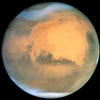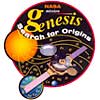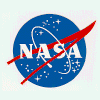|
Sunday:
August 5, 2001 | |
0426 GMT |
 |
Satellite takes more photos of Mt. Etna eruption
Mount Etna, Europe's most active volcano, continues to spill rivers of lava following a July 17 eruption. The recent activity of the 10,876-foot high volcano can be seen in two images taken by the Advanced Spaceborne Thermal Emission and Reflection Radiometer on NASA's Terra spacecraft.
 FULL STORY FULL STORY
 EARLIER PHOTO RELEASE EARLIER PHOTO RELEASE
 |  |

|
 |
Station science team set for change of expeditions
The international space station crew and ground teams are preparing to conclude one successful science expedition and begin another. Three Expedition Two experiments returned home aboard shuttle Atlantis recently. Expedition Three will have 18 experiments, including 10 continuing from Expedition Two, as well as eight new experiments.
 FULL STORY FULL STORY
 |  |

|
 |
|
Saturday:
August 4, 2001 | |
0311 GMT |
 |
NASA studies shuttle solid rocket booster problem
Space shuttle engineers are investigating cracks found inside a solid rocket booster hydraulic steering unit that could force NASA to delay next week's planned blastoff of Discovery.
 FULL STORY FULL STORY
 |  |

|
 |
Bad weather grounds NASA's Genesis mission
Rain and thick clouds forced Friday's attempt to launch the Boeing Delta 2 rocket with the Genesis space probe to be scrubbed. Officials have tentatively rescheduled the mission for August 12 -- after next week's planned U.S. Air Force Titan 4B rocket and space shuttle Discovery launches.
 MISSION STATUS CENTER - live updates MISSION STATUS CENTER - live updates
 FUTURE LAUNCH WINDOWS FUTURE LAUNCH WINDOWS
 THE DELTA 2 ROCKET THE DELTA 2 ROCKET
 GENESIS FACT SHEET GENESIS FACT SHEET
 SCIENCE MISSION OF GENESIS SCIENCE MISSION OF GENESIS
 |  |

|
 |
Titan 4 to launch Monday
Crews are gearing up for Monday's predawn attempt to launch a Lockheed Martin-built Titan 4B rocket with a Defense Support Program missile-warning satellite. The flight has been delayed due to concerns with the second stage guidance control unit that turned out to be no problem at all.
 MISSION STATUS CENTER - updates MISSION STATUS CENTER - updates
 |  |

|
 |
|
Friday:
August 3, 2001 | |
0355 GMT |
 |
Rainy weather delays Genesis launch until Friday
Technicians will press ahead with work overnight to ready a Boeing Delta 2 rocket for a possible launch attempt Friday to propel NASA's Genesis solar wind-catching probe on its three-year voyage. But the continuing bad weather at Cape Canaveral associated with Tropical Storm Barry threatens to keep the launch grounded.
 MISSION STATUS CENTER - check for updates MISSION STATUS CENTER - check for updates
 DETAILED LAUNCH TIMELINE DETAILED LAUNCH TIMELINE
 THE DELTA 2 ROCKET THE DELTA 2 ROCKET
 GENESIS FACT SHEET GENESIS FACT SHEET
 SCIENCE MISSION OF GENESIS SCIENCE MISSION OF GENESIS
 |  |

|
 |
Scientists find largest flood channels in the solar system
Scientists may have discovered the largest flood channels in the solar system on Mars, currently a cold desert planet. A system of gigantic ancient valleys -- some as much as 200 kilometers wide -- lies partly buried under a veneer of volcanic lava flows, ash fall and wind-blown dust in Mars' western hemisphere.
 FULL STORY FULL STORY
 |  |

|
 |
Galileo to fly over source of recent polar eruption on Io
NASA's Galileo spacecraft will buzz the north pole of Jupiter's moon Io early next week to get unprecedented magnetic measurements and examine the site of a dramatic recent volcanic eruption. The durable robot will skim about 124 miles above Io's surface.
 FULL STORY FULL STORY
 |  |

|
 |
|
Thursday:
August 2, 2001 | |
0412 GMT |
 |
Genesis launch tentatively rescheduled for today
Launch managers have half-heartedily rescheduled the Genesis launch for today at 12:27:09 p.m. EDT (1627:09 GMT). Given a dismal weather forecast, officials decided to continue with pre-flight work at the launch pad overnight and review the situation again in the morning. Cloudy skies above the Delta 2 rocket's launch pad at Cape Canaveral delayed the liftoff on Wednesday.
 MISSION STATUS CENTER - check for updates MISSION STATUS CENTER - check for updates
 DETAILED LAUNCH TIMELINE DETAILED LAUNCH TIMELINE
 THE DELTA 2 ROCKET THE DELTA 2 ROCKET
 GENESIS FACT SHEET GENESIS FACT SHEET
 SCIENCE MISSION OF GENESIS SCIENCE MISSION OF GENESIS
 |  |

|
 |
Cosmology Machine creates the universe
The past, present and future of the universe is about to be revealed in unprecedented detail by Britain's biggest academic supercomputer called the Cosmology Machine, based at the University of Durham.
 FULL STORY FULL STORY
 |  |

|
 |
The glory of a nearby star
The solar corona is a beautiful sight during total solar eclipses. It is the uppermost region of the extended solar atmosphere and consists of a very hot (over 1 million degrees), tenuous plasma of highly ionised elements that emit strong X-ray radiation. There is also a much weaker coronal emission in the optical part of the spectrum.
 FULL STORY FULL STORY
 |  |

|
 |
|
Wednesday:
August 1, 2001 | |
0211 GMT |
 |
Genesis launch atop Delta 2 rocket slips to Wednesday
Launch of NASA's Genesis solar wind sample return probe has been delayed until at least Wednesday while tests are performed to ensure power supply components in the craft's navigation system will operate successfully once in space. Genesis will be launched by a Boeing Delta 2 rocket from Cape Canaveral, Florida.
 MISSION STATUS CENTER - updates MISSION STATUS CENTER - updates
 DETAILED LAUNCH TIMELINE DETAILED LAUNCH TIMELINE
 THE DELTA 2 ROCKET THE DELTA 2 ROCKET
 GENESIS FACT SHEET GENESIS FACT SHEET
 SCIENCE MISSION OF GENESIS SCIENCE MISSION OF GENESIS
 |  |

|
 |
NASA's MAP satellite sets sail after lunar flyby
Thanks to a sling-shot past the moon NASA's MAP spacecraft departed Earth orbit this week bound for a quiet spot a million miles away where it will observe the fossil light from the creation of the universe 14 billion years ago.
 FULL STORY FULL STORY
 |  |

|
 |
Titan 4 launch reset
The U.S. Air Force has rescheduled the launch of the Titan 4B rocket with the Defense Support Program missile-warning satellite for Monday, August 6. The launch was delayed last week due to a problem with the rocket's second stage guidance system.
 MISSION STATUS CENTER - updates MISSION STATUS CENTER - updates
 |  |

|
 |
NASA announces team to review station program
A diverse team of world-renowned experts, including two Nobel laureates and the world's most famous heart surgeon, make up an independent task force created by NASA Administrator Daniel S. Goldin to take a focused look at the budget and management challenges facing the International Space Station program.
 FULL STORY FULL STORY
 |  |

|
 |
DAILY BRIEFING Other stories making news today
|
 |
Boeing announces major human space flight transition -- Boeing officials announced on Tuesday a major transition of work in its Human Space Flight & Exploration (HSF&E) business to better support its customers, United Space Alliance and NASA. Approximately 1,100 jobs will be redistributed with a significant portion being relocated from Southern California to Florida and Texas.
|
 |
|
Tuesday:
July 31, 2001 | |
0305 GMT |
 |
Genesis delayed again
Launch of NASA's Genesis solar wind sample return probe has been delayed until at least Wednesday while tests are performed to ensure power supply components in the craft's navigation system will operate successfully once in space. Genesis will be launched by a Boeing Delta 2 rocket from Cape Canaveral, Florida.
 MISSION STATUS CENTER - updates MISSION STATUS CENTER - updates
 DETAILED LAUNCH TIMELINE DETAILED LAUNCH TIMELINE
 THE DELTA 2 ROCKET THE DELTA 2 ROCKET
 GENESIS FACT SHEET GENESIS FACT SHEET
 SCIENCE MISSION OF GENESIS SCIENCE MISSION OF GENESIS
 |  |

|
 |
Solar probe launched
The Tsyklon 3 rocket made its return to flight today with the successful launch of the Coronas F solar observatory spacecraft from Plesetsk Cosmodrome, Russia. The Ukrainian-built satellite will study solar flares and mass ejections.
 |  |

|
 |
X-ray emission measured from jets of infant stars
Studying distant stars and their planets in different states of evolution is of great interest to astronomers and of immense importance for astronomy. XMM-Newton has added its contribution with an observation of a stellar system, L1551 IRS5. It has enabled ESA's X-ray observatory to detect -- for the first time -- the X-ray emission from its spectacular jets.
 FULL STORY FULL STORY
 |  |

|
 |
Scientists' innovation leads to patent award for Boeing
A deceptively simple innovation has led to a U.S. patent award as well as significant business benefits for Boeing Satellite Systems, the world's largest satellite manufacturer. The invention - a new method of positioning optical star trackers on satellites - enables BSS to achieve extremely precise determination of spacecraft attitude.
 FULL STORY FULL STORY
 |  |

|
 |
DAILY BRIEFING Other stories making news today
|
 |
Galileo spacecraft readies for encounter with Io -- This is the last week before the August 4 start of Galileo's next encounter with the volcanic satellite Io. As playback of data from the May flyby of Callisto winds down, the final observations include Jupiter atmospheric observations and global color pictures of Ganymede, Jupiter's largest satellite.
|
 |
|
Monday:
July 30, 2001 | |
0352 GMT |
 |
Genesis launch scrubbed
Today's planned launch of NASA's Genesis probe designed to capture bits of the Sun for return to Earth has been postponed. The liftoff was delayed so engineers can review a component in the spacecraft's navigation system. Genesis will be launched by a Boeing Delta 2 rocket from Cape Canaveral, Florida.
 MISSION STATUS CENTER MISSION STATUS CENTER
 DETAILED LAUNCH TIMELINE DETAILED LAUNCH TIMELINE
 THE DELTA 2 ROCKET THE DELTA 2 ROCKET
 GENESIS FACT SHEET GENESIS FACT SHEET
 SCIENCE MISSION OF GENESIS SCIENCE MISSION OF GENESIS
 |  |

|
 |


 The Hubble Space Telescope's majestic view of the Eskimo Nebula. This spectacular poster is available now from the Astronomy Now Store.
The Hubble Space Telescope's majestic view of the Eskimo Nebula. This spectacular poster is available now from the Astronomy Now Store.